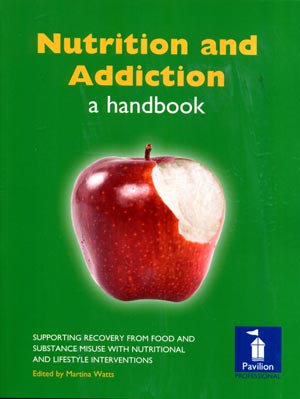|
|
Nutrition and Addiction – a handbook |
Supporting recovery from food and substance misuse with nutritional and lifestyle interventions – Edited by Martina Watts |
The handbook, which is designed primarily Martina has gathered together a fascinating collection of articles that give a compelling overview of the subject and point to new and possibly exciting avenues for research and investigation. These include: An overview by Dr Marcus Roberts, director of policy at Drugscope, of the potential role of nutrition in the care of those being treated for drug and alcohol misuse/dependency. He argues that the recent change in public drugs policy to a 'recovery-orientated' approach' provides an opportunity to place nutrition on the drug policy agenda as, if recovery is understood to require 'the maximisation of health, then the relevance of nutrition is unarguable.' Oscar Umahro Cadogan argues, and then goes on to illustrate, that drug addiction can cause 'extensive changes in neurobiochemistry, cerebral blood flow, cerebral energy utilisation, neuronal signaling, neurophysiology and neuroplasticity.' When a drug is used over a long period these changes can become permanent but they can be partially or even wholly reversed with the help of nutritional interventions. Nutritionist Helen Sandwell argues that substance misuse is usually only one aspect 'of a complex array of detrimental factors' which may include poverty, a weak family support system, childhood neglect or abuse, domestic violence, learning and behavioural difficulties, lack of education – and poor diet. She looks at the barriers to people making healthy food choices and how a balanced diet, while certainly not the whole answer, can be an important element in drug and alcohol treatment. Nutritional therapist, Jane Nodder discusses whether 'food addiction' in a clinical sense actually exists and whether 'simple nutritional interventions could be included in approaches to managing food addiction and disordered eating patterns'. Nutritional therapist and food scientist Ann Woodriff Beirne examines 'chocolate addiction' – does it really exist? Does chocolate contain enough chemically-addictive components to cause a physical addiction or is chocolate addiction just a psychological addiction brought on by the comforting organoleptic experience of taste and mouthfeel? Dr Alex Richardson, senior research fellow at the University of Oxford, looks at the role of dietary fats in addictive disorders, with especial reference to omega-3 and omega-6 fatty acids, the only fats that are critical to brain development and function. Many different psychological disorders have now been linked to deficiencies or imbalances in omega-3/omega-6 fats and it seems reasonable to suppose that such abnormalities might also play a part in additive disorders. Nutritional therapist Anthony Haynes examines the theory that you can be addicted to the foods to which you are allergic and looks at how this could be addressed. Osteopath, naturopath and nutritionist Michael Ash explores the 'emerging science that our immune system can be modified through dietary and supplemental strategies to modify its molecular messages, which may in turn assist in the management and resolution of addictive behaviour.' The book ends with a personal account from Yvonne Luna of her own struggle to manage her sugar addiction that, along with gluten, caused her dramatic mood swings and ever hovering depression.
Nutrition and Addicition - a handbook - Edited by Martina Watts. Published by Pavilion @ £23.00 ISBN 9781908066190
First published in December 2011
Click here for more articles |

 Addiction is a complex disease involving neurobiochemistry, drug chemistry and genetic, environmental and social factors,' says editor, Martina Watts in her introduction to this handbook. 'There are different levels of addiction but the fundamental nature of
Addiction is a complex disease involving neurobiochemistry, drug chemistry and genetic, environmental and social factors,' says editor, Martina Watts in her introduction to this handbook. 'There are different levels of addiction but the fundamental nature of 










